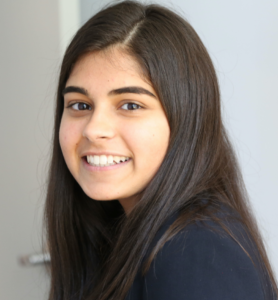
Sneha Dave is a patient activist who first came to my attention when she was profiled in Developing Health Literacy Skills in Children and Youth, the proceedings of a workshop held by the National Academy of Medicine in November 2019. At the time, Dave was an undergraduate research fellow in health policy at Harvard T.H. Chan School of Public Health. She graduated from Indiana University in May 2020 and is now CEO of Generation Patient, an advocacy organization that she started while in college. Click here for my Engaging Patients post about Dave.
Dave recently spoke with Danny van Leeuwen, host of the Health Hats podcast, about how her organization has grown, what issues she and others in the Generation Patient network are targeting and how she manages her health and healthcare at this point in her life. It’s a lively and thoughtful conversation. As with all Health Hats episodes, a transcript of the conversation is also available for download and the audio version is easy to navigate by virtue of a clickable table of contents on the episode’s webpage.
Here are some highlights of their conversation, lightly edited from the transcript:
From: Building community – Generation Patient
During my freshman year of college, I [Sneha Dave] created the Health Advocacy Summit, now called Generation Patient, which is not disease-specific. So we have young adults from everywhere — Lyme Disease, Ehlers Danlos Syndromes, POTS (Postural orthostatic tachycardia syndrome), Lupus, and arthritis. You name it: all the chronic and rare conditions. We started as an event in October 2017 in Indiana, and that was cool because it was in person. There were only about 14 attendees, but we were all from Indiana, all young adults with various chronic and rare conditions. And many of them had never met someone their age with a chronic condition. It was cool to have a safe space, and we didn’t include adults; this was solely for young adult patients. And I think that brought a lot of intimacy and honest conversations.
From: Managing yourself while advocating
I’ve lived with ulcerative colitis since I was six. It’s all I’ve ever known. And I think it, in that regard, is somewhat of a blessing to have been diagnosed so early because I don’t have this life beforehand to mourn or think about what could have been. I’ve adapted. I think a lot in terms of how to cope with low energy levels and how to do things. And I know that rest is essential. And I preach that, but I don’t always follow that. But I think part is learning what works for your body and going from there.
From: Scope – policy
We received grant funding to be able to engage in policy this past January. And one thing about Generation Patient, we are industry independent. We’ve declined all funding from pharmaceutical, insurance, or hospital industries. And that, I think, puts us in a unique position within the patient advocacy space.… We are focused on a few different issues. One is user fees and the prescription drug user fee agreements with the FDA.…The second thing is direct-to-consumer advertising on social media.… The last thing — very quickly — we also are working on state drug affordability issues.
Toward the end of the episode, van Leeuwen invites Dave to ask him a question, to which she responds:
I would love to know from you, especially with your sort of work in research, what the most pressing needs you feel are for patients to get involved in launching our own research studies. Also, how to gain more literacy about the research process. As young adult patients working organically on a lot of this work, one of the challenges is that we have so many thoughts about research studies that we feel have not been addressed for young adults. But how to start?
van Leeuwen suggests that attending the 2022 PCORI Annual Meeting would be a good place to start, which is apparently already in Dave’s plans. PCORI is the federal Patient-Centered Outcomes Research Institute. Registration for its 2-day virtual annual conference is free and open to all.





